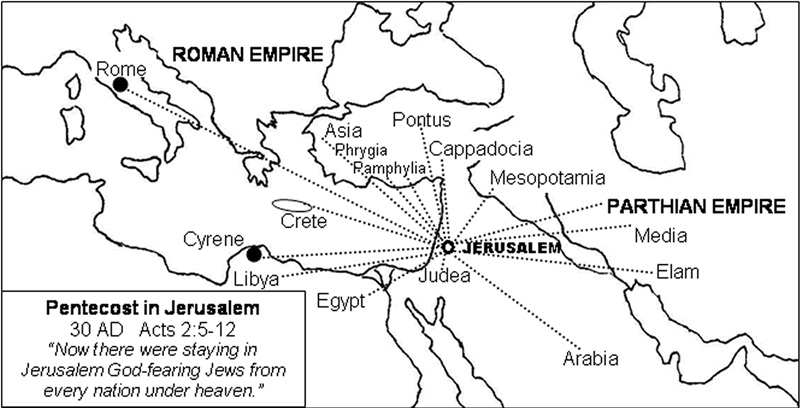1st Reading
Acts 2:1-21 or Genesis 11:1-9
Psalm 104:24-34, 35b
2nd Reading
Romans 8:14:-17 or Acts 2:1-21
Gospel
John 14:8-17, (25-27)
Happy Pentecost Sunday! Pentecost is one of the few holidays that Christians and Jews still celebrate with the same name. Easter (the day after Passover), Christmas, epiphany, the Ascension, are all distinctly Christian. Pentecost however, is counted the same for Jews and Christians. Indeed, Jesus' disciples were celebrating Pentecost when the Holy Spirit descended on them and changed the meaning of the observance for Christ's followers. The question I want to try an answer today is, why did the Holy Spirit come on Pentecost? Was there something significant about that day in the Jewish life we can gain some insight from?
To answer these questions, we first have to understand Pentecost in the Old Testament. Pentecost was also known as the feast of weeks and was celebrated on the 50th day after Passover. (Pentecost = "the fiftieth [day]" or in Hebrew Hag Hashavuot, or Shavuot as it is now called in English, meaning "feast of weeks.") The festival was celebration of the end of the barley harvest, but it was a holy day on which no work was to be done and every male Israelite was required to appear at the sanctuary. As such, on the day of Pentecost Jerusalem was full of pilgrims (much like Passover) celebrating the holy day. During the celebration, a wave offering of bread was to be offered by the priests, along with animal offerings for the sin and peace offering. (Lev. 23) Additionally, "as a day of Joy (Dt. 16:16) it is evident that on it the devout Israelite expressed gratitude for the blessing of the grain harvest." (New Bible Dictionary, IVP, 909) According to Jewish tradition, Pentecost (Shavuot) was a commemoration of the anniversary of the Law given to Moses on Mt. Sinai (NBD, 909)
I have approached my research as I mentioned, asking the question why did the Holy Spirit come on that particular day. I did this because we have all probably heard sermons on Pentecost and understand it's significance in the life of the church and the individual believer. But so far I haven't found even one source that considers this questions. Admittedly, it was not an exhaustive search, but I have read 4 Bible dictionaries, the Wikipedia entry, searched Google, and looked through a bunch of article titles at the PLNU library. It is weird that this issue isn't dealt with more, because the trend in biblical scholarship recently is to emphasize and understand Jesus/ the New Testament in light of the Jewish culture and tradition.
Since my sources have let me down, I'm left to wonder and postulate a theory myself as to the significance of the Holy Spirit coming on Pentecost. The obvious and most practical answer is that at Pentecost, Jerusalem was once again filled with Jews, and it provided a perfect opportunity for Peter and the disciples to deliver a Spirit filled sermon about Jesus. The Father sent the Spirit on this day so that the early church could start-off with a bang and people all over the Roman Empire would hear the Gospel. Below is a map of all the nations represented at Pentecost.
I am struggling to find a more theological reason, probably because I don't know enough about Shavuot or Jewish practice during this time. But again, I find it odd that I can't even one source that seems to care about this. It is hard for me to just say there isn't a deeper meaning since I don't think much happens in the text coincidentally. But for now, I will just have to say that Pentecost provided a great time for the Holy Spirit to come in a powerful new way and encourage and spread the message of the Gospel.
So I have basically wasted a week of researching only to discover nothing. Oh well, sometimes that happens. But I did learn a little bit about Pentecost in the Old Testament so it wasn't an entire waste of time. I hope your local congregation at least mentioned Pentecost this Sunday. Again, recognizing the Christian Calendar it as an easy way to add more biblical literacy to a congregation and celebrate the full life of Christ throughout the year.
Grace and Peace.

No comments:
Post a Comment